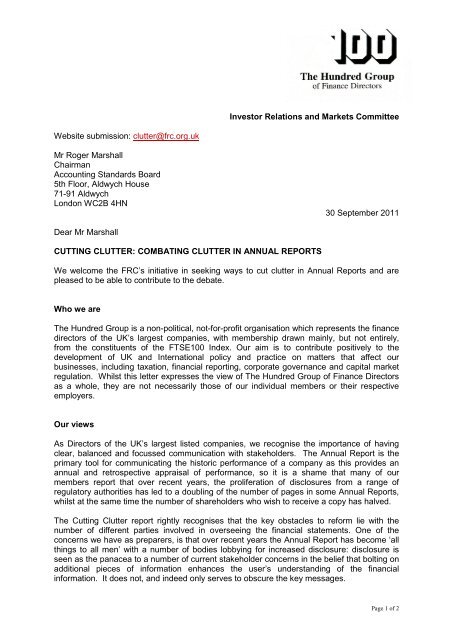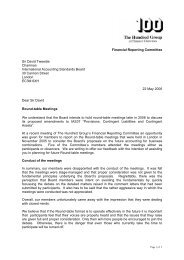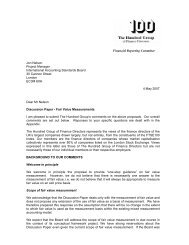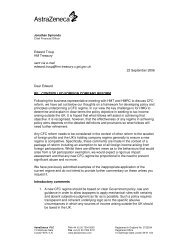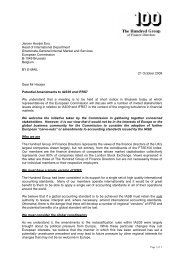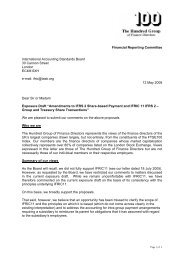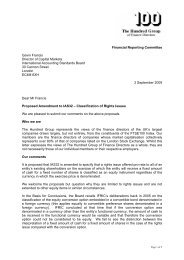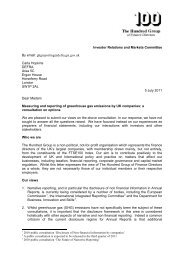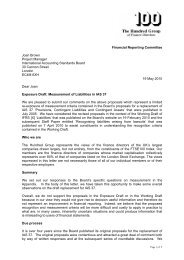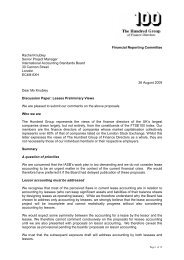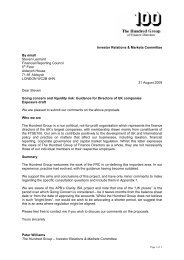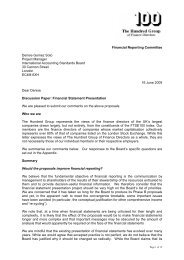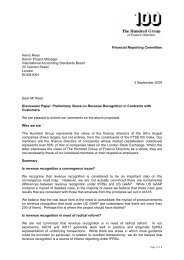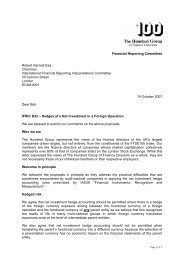clutter@frc.org.uk Mr Roger Marshall Chairman Accounting Standards
clutter@frc.org.uk Mr Roger Marshall Chairman Accounting Standards
clutter@frc.org.uk Mr Roger Marshall Chairman Accounting Standards
You also want an ePaper? Increase the reach of your titles
YUMPU automatically turns print PDFs into web optimized ePapers that Google loves.
Website submission: <strong>clutter@frc</strong>.<strong>org</strong>.<strong>uk</strong><br />
<strong>Mr</strong> <strong>Roger</strong> <strong>Marshall</strong><br />
<strong>Chairman</strong><br />
<strong>Accounting</strong> <strong>Standards</strong> Board<br />
5th Floor, Aldwych House<br />
71-91 Aldwych<br />
London WC2B 4HN<br />
Dear <strong>Mr</strong> <strong>Marshall</strong><br />
Investor Relations and Markets Committee<br />
CUTTING CLUTTER: COMBATING CLUTTER IN ANNUAL REPORTS<br />
30 September 2011<br />
We welcome the FRC’s initiative in seeking ways to cut clutter in Annual Reports and are<br />
pleased to be able to contribute to the debate.<br />
Who we are<br />
The Hundred Group is a non-political, not-for-profit <strong>org</strong>anisation which represents the finance<br />
directors of the UK’s largest companies, with membership drawn mainly, but not entirely,<br />
from the constituents of the FTSE100 Index. Our aim is to contribute positively to the<br />
development of UK and International policy and practice on matters that affect our<br />
businesses, including taxation, financial reporting, corporate governance and capital market<br />
regulation. Whilst this letter expresses the view of The Hundred Group of Finance Directors<br />
as a whole, they are not necessarily those of our individual members or their respective<br />
employers.<br />
Our views<br />
As Directors of the UK’s largest listed companies, we recognise the importance of having<br />
clear, balanced and focussed communication with stakeholders. The Annual Report is the<br />
primary tool for communicating the historic performance of a company as this provides an<br />
annual and retrospective appraisal of performance, so it is a shame that many of our<br />
members report that over recent years, the proliferation of disclosures from a range of<br />
regulatory authorities has led to a doubling of the number of pages in some Annual Reports,<br />
whilst at the same time the number of shareholders who wish to receive a copy has halved.<br />
The Cutting Clutter report rightly recognises that the key obstacles to reform lie with the<br />
number of different parties involved in overseeing the financial statements. One of the<br />
concerns we have as preparers, is that over recent years the Annual Report has become ‘all<br />
things to all men’ with a number of bodies lobbying for increased disclosure: disclosure is<br />
seen as the panacea to a number of current stakeholder concerns in the belief that bolting on<br />
additional pieces of information enhances the user’s understanding of the financial<br />
information. It does not, and indeed only serves to obscure the key messages.<br />
Page 1 of 2
If any progress is to be made in addressing the proliferation of disclosures, it will be<br />
important to establish which body will act as the ‘gatekeeper’ to the Annual Report. i.e. who<br />
has the final say as to what the regulated content needs to be. We see a key role for the<br />
FRC in this regard, although note that recent proposals for Audit Committees to publish their<br />
own reports is another example of seeking to expand rather than streamline the Annual<br />
Report – we can’t help but feel that the invitation to boiler plate these disclosures will be too<br />
hard to resist in many cases.<br />
The Report also provides some useful examples of clutter that could be considered for<br />
removal from the financial statements, however we think that the time has come for a more<br />
radical overhaul of the disclosure regime. We note the recent joint report by the Institute of<br />
Chartered Accountants of Scotland and the New Zealand Institute of Chartered Accountants,<br />
Losing the Excess Baggage – Reducing Disclosures in Financial Statements to What’s<br />
Important, which makes proposals that could reduce the length of financial statements by an<br />
estimated 30%. We hope that the findings of this report will be embraced by the FRC, and in<br />
particular by the Financial Reporting Review Panel and the Audit Inspection Unit, as<br />
demonstrating the art of the possible.<br />
We are supportive of the FRC’s proposed Financial Reporting Laboratory, although have a<br />
concern that it may lead to more and not less disclosure, at least over the short term. Rather<br />
than taking on piecemeal studies, a worthwhile project for this body would be to present a set<br />
of financial statements using the principles contained within the ICAS / NZICA report as it<br />
may help to provide a model to inform the extent and quality of company reporting in a<br />
relatively short timeframe, a move which our Members would welcome.<br />
Please feel free to contact me if you wish to discuss the views contained within this letter.<br />
Yours sincerely<br />
Robin Freestone<br />
<strong>Chairman</strong><br />
Hundred Group: Investor Relations and Markets Committee<br />
Page 2 of 2


